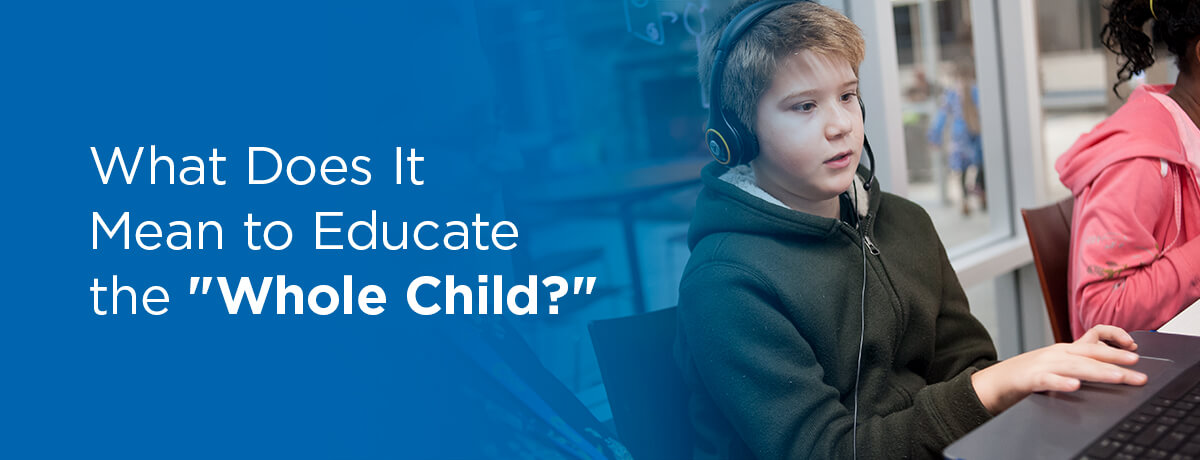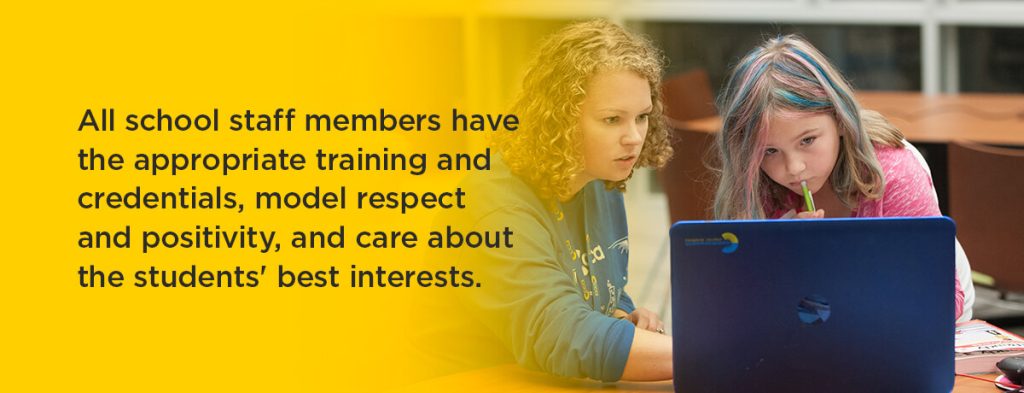Enrollment Now Open for Second Semester. Click Here
Enrollment Now Open for Second Semester. Click Here

Have you heard of the term “educating the whole child?” It may sound like a buzzword, but the concept has been around for a long time, and many schools and other institutions are increasingly leaning into this idea and bringing it into the mainstream. Educating the whole child is a far more holistic approach to education and child care and goes beyond strictly academic education, bringing in other aspects of health, development, and more. Let’s take a closer look at what whole-child education means.
The whole-child concept far exceeds the more traditional models of education that only deal with academics. This whole-child approach also considers other parts of a child’s life, including their physical health, mental well-being, social skills and citizenship, emotional health, and cognitive skills.
To support all these extra holistic qualities of a student’s life, learning environments also need to go beyond the old-fashioned models for academic learning. This setting, also known as the “school climate,” has nothing to do with the weather and everything to do with the classroom’s and school’s overall quality and character. School climate can involve a combination of the experiences and efforts of the students, teachers, parents, administrators, support staff, and other individuals in the learning space. It can also involve physical elements like classroom design, comfortable learning stations, welcoming spaces, school holidays and external factors like a healthy home and family life that supports learning.
These factors contribute to the overall school climate that’s so critical to student success. A positive school climate goes a long way toward students’ academic performance, happiness, and health. Here are some of the most crucial tenets of a healthy learning environment that supports the whole child’s education.
Safety is vital for any school, and can encompass many different facets. For in-person schools, safety means every physical aspect of the facilities is modern, secure and up to date. From buildings to furniture to playground equipment, everything meets current safety standards. Online safety standards are also critical for distance learning or in-person online activities.
Another aspect of creating a positive and safe learning environment is having behavioral standards and mutual respect across students, teachers, and other staff. Everyone should feel welcomed, supported, valued, and cared for at school. Fairness, equality, and the well-being of all students are priorities. All this creates a friendlier, more positive school atmosphere that keeps students motivated and ready to learn.

For any school system, a robust support network creates the ideal learning setting, and this encouragement is a pivotal facet of educating the whole child. High-quality, well-trained teachers are at the center of this support network, but schooling often involves far more than the teacher-student relationship. A support system at school also involves every other administrator and staff member at the facility. All school staff members have the appropriate training and credentials, model respect and positivity, and care about the students’ best interests.
A supportive school environment also means the school welcomes all types of families, and offers plenty of resources for students and parents. The parents themselves play a role at home by being helpful, positive, and encouraging toward their children.
The most supportive schools customize instructional approaches and adapt to each student’s needs. Teachers and staff members stay involved with students, assessing their progress and meeting each individual where they are in their learning abilities. Students should feel encouraged by everyone at their school.
You’ve probably heard the phrase, “It takes a village to raise a child.” This well-known aphorism hints at a sense of community in a child’s development. Often, a well-rounded education that supports the whole child involves many opportunities for connections with the surrounding neighborhoods. It may include a wide array of resources and opportunities throughout the academic calendar, but the common factor is that it provides enrichment and opportunities to students that they otherwise might not have.
Community connections may include curricula related to citizenship and being a good neighbor, including education related to sustainability and the environment. It also might involve extracurricular activities, field trips, experiential learning, service projects, and outreach. Schools can partner with other local organizations to provide internships, apprenticeships, and other learning opportunities for students to explore their interests. Partnerships with sister schools or local universities may provide additional connections, in addition to tutoring, health services, etc. And whether it’s an in-person or online school, holidays can be excellent chances for students to get hands-on experience in volunteering projects and other real-world community involvement.
In a whole-child educational program, social and emotional learning is a priority alongside academics. Traditional schools don’t always address these crucial topics. Social and emotional learning opportunities involve plenty of socialization practice in the school setting, and use curricula that provide opportunities to work on crucial interpersonal skills. These can include teamwork, conflict resolution, understanding and effectively managing emotions, dealing with challenges and adversity, setting goals, working on complex feelings, developing empathy, or building self-esteem and confidence.
Promoting these social and emotional skills at school has immediate and long-term benefits for students. When students learn these critical life skills, it equips them to deal with all sorts of challenging situations later in life. These abilities help in relationship-building, decision-making, facing challenges, and so much more. Students with a solid social-emotional learning background are more likely to have career success and build positive relationships throughout their lives.
At Commonwealth Charter Academy, our unique, flexible and customizable approach to learning benefits each student according to your family’s schedule. We understand the value of educating the whole child and providing all sorts of additional resources and opportunities for our students. Though we provide online education, our students don’t just sit in front of a computer every school day. As you probably expect, online schools have daily breaks, most of which are the same as traditional schools.
As an accredited public online school, CCA is proud to offer field trips, socialization opportunities, cyber school holidays, extracurricular activities, internships, and other special events, in addition to our regular school schedule. We provide an inclusive, positive setting that helps our students be the best they can be. Learn more about our nurturing learning environment by requesting more info today, and consider enrolling your child in our online program.
Enrollment Now Open for Second Semester. Click Here